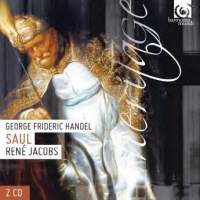Texte paru dans: / Appeared in: |
|
|
Outil de traduction |
|
|
|
|
|
Reviewer: Melanie
Eskenazi
Saul is one of Handel's
greatest works, containing some of his most moving, challenging and
inspiring music as well as some of his most dramatic and subtle
presentations of character, so it is no surprise that it has been well, and
often, recorded. Of the versions currently available, including this latest
one, each has virtues, but for connoisseurs of Handel-singing there is no
single obvious recommendation, despite the ravings that have attended both
this version and the recent recording by the Gabrieli Consort under Paul
McCreesh.
As you would expect from
Jacobs and Concerto Köln, the playing is lively, stylish, and distinctive,
with exceptional management of contrasts such as that between grandeur and
bellicosity: the choral singing of the RIAS Kammerchor could not be
bettered, especially in the superb “Envy! Eldest born of hell!“ and the
melancholy shading of “O fatal day!“ In these areas, and in Jacobs's own
eloquent keyboard-playing, this set stands out despite the usual
idiosyncratic continuo introductions and occasional questionable use of
ornamentation: however, in terms of the solo-singing it cannot compare to
that offered on the Gardiner (Polygram) and McCreesh (Archiv) versions.
Jacobs has a very interesting
David in Lawrence Zazzo, but his tone is rather dry; and although he
provides plenty of vocal fireworks, these are not always offered where they
are most appropriate. He is no match for Andreas Scholl on Archiv, whose “O
Lord, whose mercies numberless“ is simply peerless, and whose articulation
in “Your words, O king“ is an object lesson in technique used in the service
of the music. Just listen to how Scholl shapes and caresses the lines and
gives powerful intensity to the emotion in lines like “What language can my
grief express? . . . more than woman's love thy wondrous love to me!“ and
then hear Zazzo's perfectly decent, but unremarkable version. Gardiner's
David is Derek Lee Ragin, whose singing is always musical, but his rather
thin tone is no match for Scholl's lucent stream of sound.
Jeremy Ovenden's singing of
Jonathan is in a similar style to that of Zazzo, that is to say highly
competent but rather arid in tone: he decorates his music neatly but cannot
match the tenderness nor the Handelian style of John Mark Ainsley in
Gardmer's recording, whose flourishes on “From Virtue let my friendship
rise“ and moving singing of “But sooner Jordan's Stream“ easily outclass
both Ovenden and Mark Padmore (for McCreesh). The Saul of Gidon Saks on the
present recording is sharply characterized but lacking in the requisite
grandeur and hubris. Alastair Miles on Polygram is easily the finest
recorded singer in this role, both anguish and duplicity wonderfully brought
out in singing of real power and edge.
I found the women on this
recording very disappointing: I have admired Rosemary Joshua on stage, but
her Michal sounds thin and lacking in warmth, especially in “O fairest of
ten thousand fair,“ where Lynne Dawson (Gardiner) produces such affectingly
graceful singing. Emma Bell is reliable as Merab, but she, too, does not
live up to my expectations from her opera performances. The smaller roles
are likewise sound but unremarkable, with the second tenor easily outclassed
by Neil Mackie on Polygram. Jacobs has superb choral singing and orchestral playing, but the soloists are not on the level of the two other leading versions: I would not want to be without Scholl's unrivalled David (for McCreesh) so that version would have to be chosen over Jacobs; but for the other roles, especially those of Jonathan and Saul, I would have to recommend the Gardiner recording.
| |
|
Sélectionnez votre
pays et votre devise en accédant au site |
|
|
|
|
|
|
|
|
Cliquez l'un ou l'autre
bouton pour découvrir bien d'autres critiques de CD |
|



